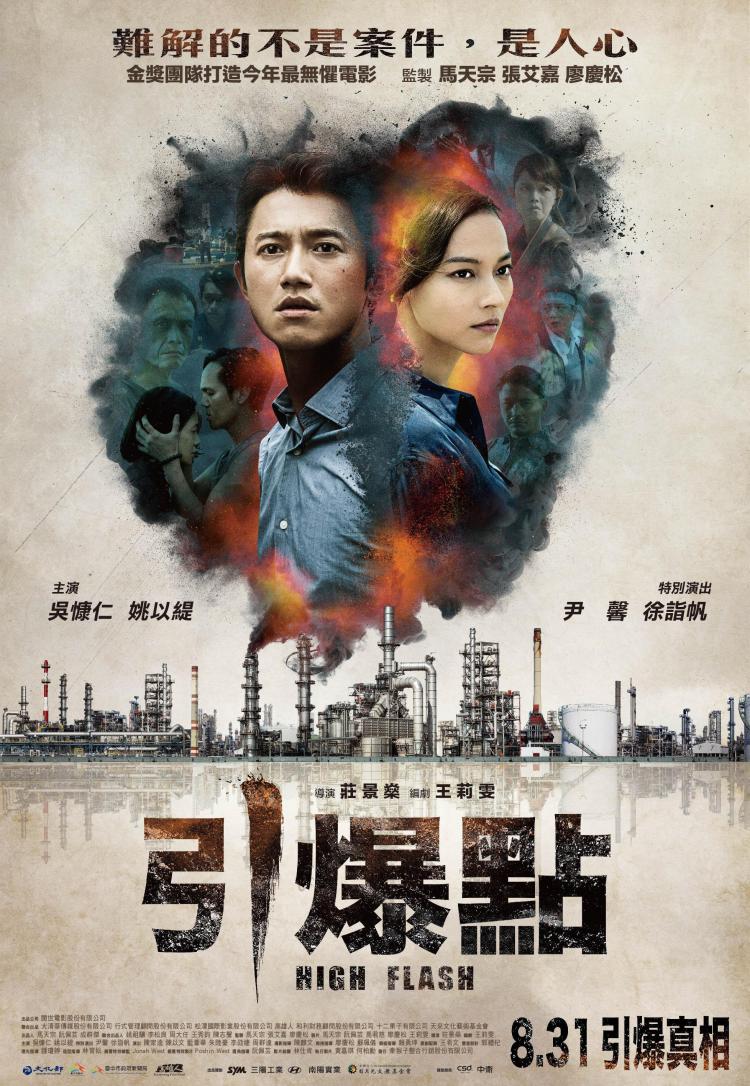 The little guy is often at the mercy of big business, but the conspiracy runs still deeper in Chuang Ching-shen’s high stakes thriller High Flash (引爆點, Yǐnbàodiǎn). Set in the relatively unglamorous world of a small fishing village, High Flash begins with a mysterious death but quickly spirals outwards to ask questions about the connections between industrial conglomerates and the political establishment both local and national. Those who seem keenest to root out corruption may in fact be no less self serving than those who take advantage of it but perhaps there’s nowhere free of greed and selfishness when there are such gains to be made.
The little guy is often at the mercy of big business, but the conspiracy runs still deeper in Chuang Ching-shen’s high stakes thriller High Flash (引爆點, Yǐnbàodiǎn). Set in the relatively unglamorous world of a small fishing village, High Flash begins with a mysterious death but quickly spirals outwards to ask questions about the connections between industrial conglomerates and the political establishment both local and national. Those who seem keenest to root out corruption may in fact be no less self serving than those who take advantage of it but perhaps there’s nowhere free of greed and selfishness when there are such gains to be made.
The action opens with a fierce protest by the local fishing community towards the large scale Tonglian petrochemical plant which they believe has been polluting their waters, ruining their health and livelihoods. While the newly elected mayor, Chen (Lan Wei-hua), is giving his best at the megaphone, a commotion breaks out when a burning boat collides with protestors and is later found to be harbouring the body of one Ah-hai (Bokeh Kosang / Hsu Yi-Fan) who is assumed to have committed self immolation in protest of the plant’s continued intransigence.
Earnest medical examiner Chou (Chris Wu Kang-Ren) isn’t sure that’s the case. His evidence suggests Ah-hai, who was already terminally ill with liver cancer, did not die of burns or smoke inhalation while his kidneys also exhibited strange florescent spots later identified as copper sulphate. Chou’s findings are music to the ears of jaded prosecutor Jin (Yao Ti-Yi), who also happens to be Chou’s former fiancée. She too is convinced there’s more to this than the elaborate suicide of a man whose life had been ruined by the heartlessness of big business.
Chuang quickly sets up the expected contrast between the scientifically minded Chou who claims to assess only hard evidence without emotional baggage, and the passionate Jin who is desperate to expose the truth at any cost though the romantic drama between the pair never quite ignites even as the past continues to inform their present relationship and the case at hand. Despite his insistence on hyper-rationality, Chou is not is a cold or unfeeling man as he proves by tenderly introducing himself to Ah-hai’s body and asking for his cooperation in investigating why he died, but his rigidity is perhaps to have unexpected consequences despite his best intentions which see him taking a special interest in Ah-hai’s unfortunate wife and son.
Ah-hai’s illness and that of his little boy who is suffering from a brain tumour are not explicitly linked to the illicit activities of Tonglian but the implication is clear. Industrial pollutants have destroyed not only the local fishing industry but with it a community which is now suffering with a large number of serious and unexplained illnesses. Tonglian, as might be assumed, is not particularly bothered, assuming it can rely on friends in high places and a complex web of thuggery and corruption to deal with any more serious opposition. Meanwhile, Ah-hai’s death is already being repurposed for political gain. The village regards him as a hero and a martyr who sacrificed himself in the most painful of ways in order to bring attention to their plight and the evils of Tonglian. None of which, however, is much use to his wife and son who are now unable to claim on his life insurance and are left without an income.
Vested interests exist on both sides – those keen to uphold Ah-hai as a hero and a martyr at the cost of his wife and son, and those keen to minimise the effects of his death in ensuring Tonglian is able to go on doing its (extremely dodgy) business with the same bottom line. While top execs boast about making a killing on the fluctuating company stocks and spending it on yachts, horses, and vintage wine, Ah-hai’s wife and son are left at the mercy of prevailing forces and fearful for their futures. The village might well feel that seeing as Ah-hai is dead anyway making a martyr of him whether he was one or not might be worth it if it helps expose Tonglian’s various transgressions but then again they may have overestimated the extent to which anyone really cares about big business corruption and the complicity of the state.
Nevertheless, in true conspiracy thriller fashion getting too close to the truth can prove dangerous and Chuang perhaps missteps in the case of whom he allows to pay the price, but his anti-corruption messages and warning about the cynical hypocrisy of big business eager to claim it cares about the little guy and his environment are sadly universal, as are his world weary implications regarding the eventual corruption and diminishing efficacy of longterm protests.
High Flash screens as part of the eighth season of Chicago’s Asian Pop-Up Cinema on March 28, 7pm at AMC River East 21 where director Chuang Ching-shen & actor Chen Chia-kuei will be present for a Q&A.
Original trailer (English subtitles)
